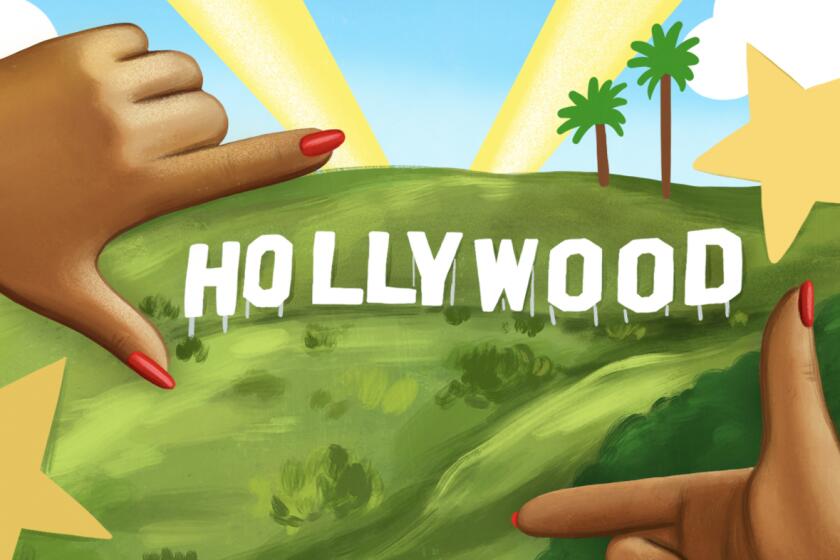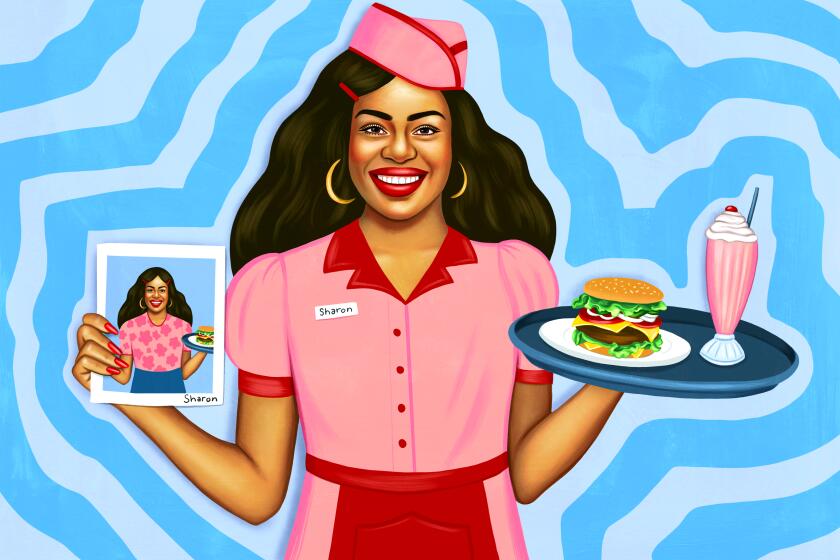Explaining Hollywood: How to get a job as a producer

- Share via
Growing up on the Palos Verdes Peninsula, Siena Oberman thought she might want to be a doctor. Then she took a high-school elective that allowed her to go off-campus.
“I thought, ‘Oh, sweet, I can leave class and go to the beach,’” she said.
Instead, she fell in love. The class was in filmmaking, and Oberman started making movies with her friends using a Flip camera. No beach bum but in fact an overachiever, Oberman quickly assembled a resume of internships more varied than most careers: IM Global, an international sales firm; Route One Entertainment, an indie film company; Plan B, Brad Pitt’s production company; Paramount Pictures; United Talent Agency.
In her sophomore year at Loyola Marymount University, she wrangled a meeting with a senior executive at Warner Bros. “He told me if I wanted to be successful, I need to get really good at one thing,” she remembers. That one thing was making movies happen — producing.
Oberman transferred to USC and began taking her small movies to film festivals — from Outfest to Cannes — and going “to every networking event I could,” she says. “I realized that if you can bring an actor or money or a big director, if you could make certain connections, then you could get involved in projects by bringing value to them.”
By age 26, Oberman had 13 producer credits to her name, including four as lead producer. When I watched her in 2019 on the set of the fourth, “The Birthday Cake,” an indie mob picture set in Brooklyn that was released this month , she was nimbly juggling a dozen tasks at once, including a balky financier in South America; a set overcrowded with hangers-on and Val Kilmer’s personal documentary crew; an unexpected delay in Paul Sorvino’s arrival; conked-out Wi-Fi; and a crew member who wasn’t up to the job. I asked her if this was a typical day on set. She said there was no typical day. “For me the priority is: What’s the biggest emergency?”
Just as there is no typical day in a producer’s life, there is no typical path to becoming one. It isn’t something kids tend to dream of doing when they grow up, in part because it’s hard for even many grown-ups to get a handle on what it is.
Check out any movie’s closing credits and you’ll see a long list of people called “producers.”
“It’s the only title anyone can just decide to join,” said Lynda Obst, a producer and the author of the industry memoir “Hello, He Lied.” “But some of us have to stay and make the movie.”
Many credited producers are simply financiers. Others may not have paid money but made a connection or performed a crucial favor. Or they may be an actor who’s gotten a credit (and some back-end money) in return for taking a pay cut.
Look closer, though, and you’ll see a little “(p.g.a.)” at the end of two or three names. These are the “creative producers,” certified by the Producers Guild of America (following a rule instituted in 2012) as having been involved with the project from start to finish. They have overseen or handled every step: finding a script and polishing it; charming financiers into backing it; getting distributors to guarantee sales or a studio to bankroll it; setting up an on-set team; wooing the right actors; putting out fires on set; test-marketing and finalizing the edit; negotiating the right release date and fine-tuning the marketing.
That’s who we’re interested in here.
We Can Teach You That
How to build a career in Hollywood
Join Times reporters Anousha Sakoui and Wendy Lee, as well as Bree Frank, vice president of physical production for unscripted TV at Hello Sunshine, and Phillip Sun, the president and co-founder of the management company M88, for a virtual webinar on careers in the entertainment industry. We’ll discuss the state of Hollywood jobs, how aspiring entertainers can get a foot in the door, and take your questions.
When: Tuesday, Aug. 10, 6 p.m. Pacific time
Cost: $10 for Times subscribers; $20 for non-subscribers
Tickets: Sign up on Eventbrite
What’s on your mind? Please let us know in advance of Aug. 10 about your interests and most pressing questions about working in Hollywood. Share your questions here.
Who becomes a producer?
An organizer: Anne Lai, who spent years leading the Sundance Institute’s Producing Labs before becoming executive director of the San Francisco Film Festival, says that “if there are common themes” among those who gravitate toward producing, “it’s like, ‘I was the person who put parties together. Or when the kids on the block played kickball, I would organize it.’ It’s someone who knows how to build teams.”
A left-brain/right-brain thinker: In most of the stories producers tell about their origins, there comes a point where the artistic impulse melds with an analytical mind-set. Even while on set, Oberman spent as much time going over numbers — forms for tax breaks, financing contracts, cash-flow calendars — as she did ensuring that the cinematographer got enough wide shots to give them options in the editing room.
Producers are as likely to come from majors like economics as they are to emerge from English departments; some move over from careers in finance or law. Even the artiest indie producers have to deal in spreadsheets.
Christine Vachon, legendary for producing some of the most daring films of the late ‘90s and early aughts (“Boys Don’t Cry,” “Far From Heaven,” “Velvet Goldmine”), wrote an indie-producing bible, “Shoot to Kill,” which included plenty of wild anecdotes and aesthetic mantras but also an itemized 30-page production budget.
A nurturer: Jordan Horowitz, one of the producers of “La La Land,” recalls trying a new tactic once while prepping for industry meetings.
“I remember making a chart of what everybody’s priorities were,” he says. “Actor, executive, whoever. To see how my priority could intersect with everyone’s priority.” An actor wanted the best part; an executive a safe bet; a director the fulfillment of a perfect vision. “And it was so interesting to see that for the producer, it was the project. The project was never anyone else’s first priority.”
How do you get started?
About this article
This article has been adapted from “Becoming a Film Producer.” Copyright © 2021 by Boris Kachka. Reprinted by permission of Simon & Schuster, Inc. All rights reserved.
Unlike such specific pursuits as acting or costume design, production has relatively few academic tracks (though there are producing programs) or entry-level prerequisites. That said, many producers share the same path as others in the industry — starting at the bottom, as an assistant, and making connections on the way up.
Film school: An obvious first step, with USC being the gold standard — though it bears remembering that Steven Spielberg was rejected by USC, went to Cal State Long Beach and did just fine. Film school is a natural hub for the brightest and most passionate budding filmmakers — in other words, a great place to meet your future collaborators.
Industry assistant work: Hollywood runs on assistants, and the next generation of power brokers get their training in these trenches. Most common is a position in one of the big talent agencies that dominate Hollywood: United Talent Agency, Creative Artists Agency, ICM Partners and William Morris Endeavor.
It’s the easiest place to get your foot in the door; there’s plenty of turnover and demand. Variously called “boot camp” or “grad school” by insiders, it’s both a grueling gantlet (subject, as recently documented, to low pay and occasionally abusive behavior) and a huge learning experience.
Agencies are factories of information, and assistants learn everything, in part because their job is to listen in on every call. They hear how everyone works — agents, producers, executives, directors and actors — and can figure out pretty quickly which one of those corners of the industry they’d want to work in.
Production office jobs: For would-be producers, there are also lower-level jobs in production companies. You can be a production assistant (P.A.) helping out on set before moving up to the next stage — perhaps “development,” meeting with agents and finding scripts and writers. An assistant might eventually score an associate producer credit. From there you might become a production executive (keeping the office running) before becoming a partner or striking out on your own.
Send the L.A. Times your questions about breaking into and working in the entertainment industry.
What are the career paths?
Lai remembers sitting in on a movie when an actor walked by and asked what it was she did all day. A fellow producer cut in: “It’s like we’re pilots. We have to put everyone on the plane. We have to get everyone safely off the ground. We have to get to 20,000 feet. And our job is basically not to crash while you guys do the work.”
There are two ways to get the plane off the ground — essentially two ways to be a producer:
Studio-backed films: In the old days, most producers worked for studios, which took care of financing and expenses. Nowadays there are still producers “on the lot” — like Obst at Sony — but they are semi-autonomous and can take rejected projects elsewhere. Still others have first-look deals with one or more studios, streamers or networks that might cover some of their overhead.
Even in the absence of such a deal, an independent producer would usually prefer to line up a studio before the actual filming begins. If that happens, the producer gets her fee or percentage and it’s smooth sailing — with the huge caveat that the studio is ultimately calling the shots.
“Television is so huge now that you can find these lanes where, if you’re in the right place at the right time, you can get something really interesting done.”
— Michael London
Independent films: For movies without a star or clear genre potential, a pre-production studio deal might not be in the cards. In order to make an independent movie, the producer must cobble together financiers to pay up-front costs.
These are investors, not benefactors, their money securely backed by foreign sale guarantees and bridge loans. (These are the films that really rack up the “producer” credits). In the event of a sale to a distributor, often at a film festival, the investors get paid back first. The producer is among the last to see back-end money if the film takes off.
Oberman still goes this route. She also used Lai’s pilot analogy when we first met, just as “The Birthday Cake” was set to start filming but still awaiting its final financing — essentially, taking off without enough fuel to land.
“It’s just a reality of indie producing,” Oberman said. “Almost every movie close to production feels like it’s going to fall apart. … Even today, my state of mind is, ‘I think I’m making a movie in a week?’ It doesn’t hit me as fully real until everything is locked in.”
Every independent film project is like this. In fact, no film is a done deal until the day it’s released. It’s what makes the process thrilling but highly unstable.
It can take years of toiling on a project before it comes to fruition — or pitching multiple projects before one happens to take flight. Inevitably, there are low points, moments of extreme self-doubt.
For producer Michael London, the break came a couple years after he had left a plum position as a producer at Fox to hang out his own shingle.
“I left the lot, and I was a little lost,” he says. “I left my relatively plush job and my office and my assistant. I was working out of my house, and I wasn’t exactly feeling overconfident about things.”
But he had fallen in love with an unpublished manuscript from a friend, Rex Pickett, about two guys having a lost weekend in California wine country. He just needed a filmmaker.
One evening, a few days before he was planning to give up and look for a job, he got a phone call in his home office. Alexander Payne wanted to make the script into a movie, which became the successful and critically acclaimed 2004 film “Sideways.”
Rejection and uncertainty are part of working in Hollywood, but joy, creativity and fun can be too. Here’s how to manage your mental health.
How do you make money as a producer? (And what kind of money?)
There are easier ways for a smart and driven person to earn a living. A producer’s earliest training, whether as an assistant or in film school or in the mad scramble to get a friend’s movie made, can net close to minimum wage.
Sometimes a producer takes a flat fee on a project, other times a cut of a movie’s production budget — maybe 5%. But everything can be subject to change throughout the long development process. A small movie can earn a producer $30,000 for six months of work. And when a production’s budget needs tightening, a producer’s fee tends to be the first to go — because the boss can’t quit.
Ultimately, producers can and often do make a lot of money. But it only kicks in after all the work of development, fundraising, talent scouting and staffing has been done. If a studio has acquired it by then, the money starts to flow only when filming begins — but that 5% of the budget can mean millions.
Some eventual percentage of net profit is often worked into the deal, but as producers are among the last to be paid, it takes the rare blockbuster for the eye-popping money to kick in.
How has being a producer changed in 20 years?
London knows more about Hollywood’s evolution than most; he’s been adapting deftly to its seismic shifts from the beginning of his career.
On the strength of “Sideways” and two other successful projects, “The Family Stone” and “The Illusionist,” London set himself up for a successful career in the mid-aughts.
“I was riding the tail end of the indie movie explosion,” he says. “There was a lot of excitement about the notion that you could find broader audiences for more personal films.”
In 2006 he founded Groundswell, the fruit of a collaboration with CAA (Creative Artists Agency) and capital investors from Wall Street. The company made “Milk,” “The Visitor” and “The Informant!,” among others. And then the bottom fell out.
Two giant markets collapsed simultaneously in 2008 — the one for stocks and the one for DVDs. Between those two forces, it suddenly became much harder for London to find the financing he needed through Groundswell. He had to return to the life of an independent producer.
The way out of his impasse is obvious if you’ve been watching anything over the past decade. Even before indie film production began to buckle, TV had begun to rise in prestige, setting off a highly competitive market that then became super-heated in the era of streaming. Early on in that evolution, London got the idea for his first TV show. The only taker was a tech company just moving into TV: Amazon.
“Betas” became one of Amazon’s first shows. “It reminded me of ‘Sideways’ and ‘Thirteen,’” he says, “where the financiers said, ‘Go off and make what you want to make.’”
He secured a first-look deal with a television arm of Fox and rode the content boom with projects in keeping with his taste; when he delved into genre, there was always a strong storytelling element. For FX, he made “Snowfall”; for Showtime, he made “SMILF”; Hulu aired “Chance,” starring Hugh Laurie; “The Magicians” ran on Syfy for five seasons.
“I feel like I get to be here for a second golden moment,” says London. “Television is so huge now that you can find these lanes where, if you’re in the right place at the right time, you can get something really interesting done.”
For many people who pursue entertainment as a career, it takes years to get yourself to where you are making money from your creative work. For making money in the meantime, there’s always waiting tables. But more and more people are turning to platforms like TikTok, Twitch and Patreon.
What advice do pros always hear that is wrong?
In a field that many enter through side doors, the only wrong advice is that you have to follow any particular path.
You don’t have to go to film school. London’s career began when producer Don Simpson liked a profile he wrote for the L.A. Times; Obst was a magazine editor before she made the leap. Some producers argue that in a field where youth and energy are at a premium, it’s better to just jump right in and find a job.
You don’t have to be an assistant. Oberman skipped right past the agency-assistant path and turned out just fine. If you can wrangle a job in development or on set, that may be just as good a path.
And thanks to the rise of TV, you don’t have to get a studio deal. With so many streaming services competing for the right story — whether from a book or magazine piece or the fertile mind of a young screenwriter — all it takes is a great concept (plus a committed name actor and some open-minded financiers). Oberman manages without any first-look deals; she’s trying to build up her portfolio first, maintaining full creative control until she finds the right partner at the right price.
The entertainment industry has been plagued by scams targeting acting hopefuls, parents of child actors and others. Here’s what to look out for and what to do.
What’s some good advice?
Networking is key. A producer’s job is to make connections. So many projects come together through what looks like serendipity: An agent for an in-demand director turns down a project on her behalf but passes the script along to a famous playwright, who happens to love it. That’s not luck; that’s the result of a producer knowing the right agent and keeping an open mind.
Persistence is essential. There are legendary projects that waited years — through actor defections, production snafus, botched rewrites and studio turnover — only to find the right team and the right moment and click instantly. Behind nearly every “surprise success” that actually took years to pull together, there is a producer with a Plan A followed by B, C, D, E and so on.
Hear everyone out, but trust yourself. Once you’ve learned everything you can about the industry — from mentors, actors, test audiences — figure out your own tastes and limits. Not every project will get made, and even fewer will find a large audience (never mind leaving a cultural mark). But no movie or show that does break through can do so without the guiding hand of a producer who projected unbridled confidence. London waited years for Payne to get freed up to make “Sideways” — which was a risk, but his instinct told him Payne was the right director.
Oberman’s early success showcases all these qualities, beginning with her breakthrough moment. In her senior year at USC, Oberman had a pinched nerve; in treating it, a doctor broke one of her vertebrae. Unable to sit for 10 hours a day, her plan to become an assistant was derailed. But it might have been the best thing that’s happened to her so far.
“I went to a lot of festivals, did general meetings with tons of people and asked them for advice,” she says. “I had a lot of time on my hands, which I spent researching the business and consuming films.” And then, she decided to start producing.
“The idea that I’m going to go get famous actors and millions of dollars and suddenly ‘be a producer’ at 22? I don’t think I would ever have been brave enough to pursue it because it’s kind of crazy.”
But a few years and many movies later, she wouldn’t trade her agonizing, exhilarating job for anything in the world.
Read more of The Times’ guide to working in Hollywood.
More to Read
Inside the business of entertainment
The Wide Shot brings you news, analysis and insights on everything from streaming wars to production — and what it all means for the future.
You may occasionally receive promotional content from the Los Angeles Times.















